-
The University
- Welcome
- Who we are
- Media & PR
- Studying
-
Research
- Profile
- Infrastructure
- Cooperations
- Services
-
Career
- Med Uni Graz as an Employer
- Educational Opportunities
- Work Environment
- Job openings
-
Diagnostics
- Patients
- Referring physicians
-
Health Topics
- Health Infrastructure
Sustainability
Sustainability is not a scientifically defined term but a sociopolitical mission. As part of the restructuring of infrastructure through our campus, the Medical University of Graz has firmly anchored all topics related to sustainability in its strategy and mission statement.

Sustainable living. learning. researching
According to our mission "sustainable living. learning. researching," we are aware of our responsibility to society and take our role as flagship project for sustainability very seriously: Module 1 of Med Uni Graz is the first research and laboratory building in Austria to receive the highest level of certification from the Austrian Sustainable Building Council (ÖGNI)—the result of a holistic approach that unites economic, environmental and social aspects and sets new standards. Expanded connections for public transportation and a carefully thought out bike path network are important steps toward a sustainable mobility concept.
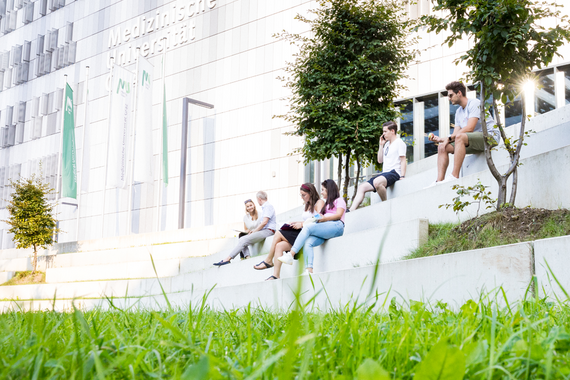
Sustainable building concept
With the modules 1 and 2, the three pillars of sustainability (environmental, social and economic) have been supplemented by functional and technical sustainability with the goal of focusing primarily on building use. An open construction plan was chosen along with a site with space for future expansion. In the planning stage, around 50 sustainability criteria were worked out by Med Uni Graz, Bundesimmobiliengesellschaft m.b.H. BIG, the general planner Riegler Riewe Architects, the local construction supervisor Vamed and ÖGNI auditors.
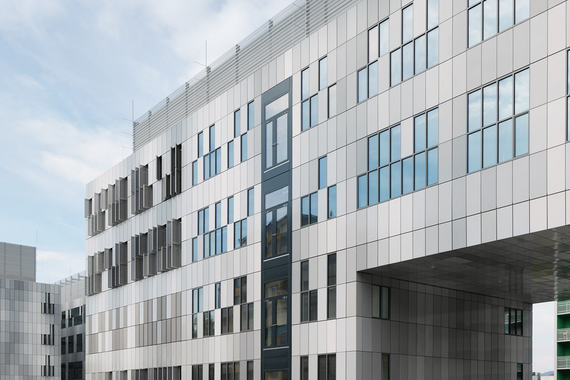
39 percent less energy consumption
According to the calculations of the general planner, our campus uses around 39 percent less energy than a comparable building in use, thereby complying with legislation for minimum standards. This shows that the project is as worthwhile from an environmental perspective as from an economic one. In addition, the users benefit from health-promoting aspects associated with its construction: the maximum exploitation of daylight, the option of natural ventilation, construction materials that are free of pollutants and much more.
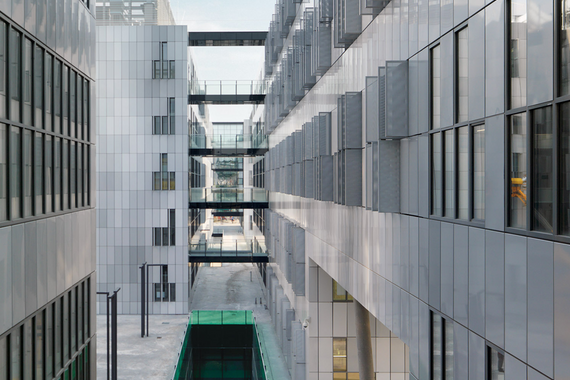
Outstanding energy-design
The energy design of the Med Uni Graz campus is outstanding: A geothermal plant provides a significant proportion of the required heating and cooling. Thermally activated energy piles are used and warm outgoing air from the server and lab rooms is exploited. Low temperature applications of the extensive heating and cooling loss/return systems also ensure reduced energy consumption. The facade is also aligned to make optimal use of daylight, and heat pumps, solar panels, natural ventilation, moveable sunshades and optimized heat insulation have been implemented.
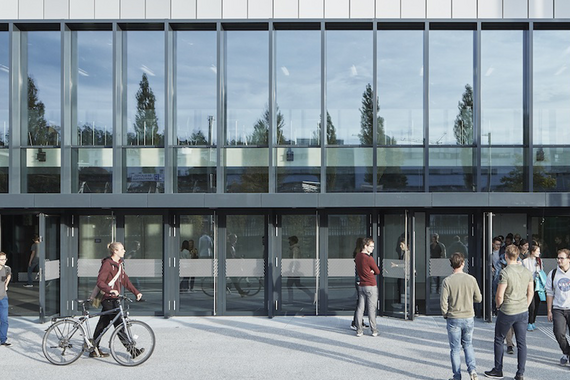
Aspects of sustainability
- Health-promoting work and learning environment with maximum exploitation of daylight and the option of natural ventilation
- Optimized acoustics with reduced reverberation times and acoustic panels on ceilings and walls
- Great thermal comfort in summer and winter from an improved building shell, pollutant-free construction materials, etc.
- Barrier-free building
- Deliberate placement and orientation of structures in relation to the prevailing main winds to maintain the space as an important fresh air corridor into the city of Graz
Contact
Office of the Vice Rector of Clinical Affairs, Innovation and Sustainability
T: +43 316 385 72088
Sustainability4U Initiative
In the initiative Sustainability4U, four universities in Graz—Med Uni Graz, Uni Graz, Kunstuni Graz and TU Graz—have formed an alliance on the topic of sustainability. In this sense, a strategic advising, development and action committee was established in order to act on (and react to) internal, interuniversity, regional, national and global challenges and opportunities based on environmental, economic, social and institutional principles of sustainable development. Examples of actions include the working out of a joint mobility concept and the establishing of a lecture series in which recognized experts from all four universities and renowned external lecturers examine current topics from a variety of perspectives.
ALLIANCE OF SUSTAINABLE UNIVERSITIES
Med Uni Graz is a member of the Alliance of Sustainable Universities in Austria, a network in which the universities join forces to promote sustainability in teaching, research and university management and to contribute to a more sustainable society. The primary goals of the alliance are to carry out joint activities, exchange experiences and take advantage of synergies in five areas: teaching, research, university management, knowledge transfer and sustainability strategy. The overarching goal is to firmly anchor sustainability issues at the universities in order to contribute to the sustainable development of society.
Tips for more sustainable mobility

The Trip
- Plan your trip well and take into consideration different means of transportation (e. g., bus, train).
- Avoid flights if possible, above all short-haul flights. If you fly, book nonstop flights.
- If you are going abroad with Erasmus+: Use the Interrail Pass for Erasmus+
- Travel with little luggage. This also makes it easier to avoid taking a taxi after you arrive.
- Compensate for CO2 emissions.
- Print out your travel documents only if it is absolutely necessary.
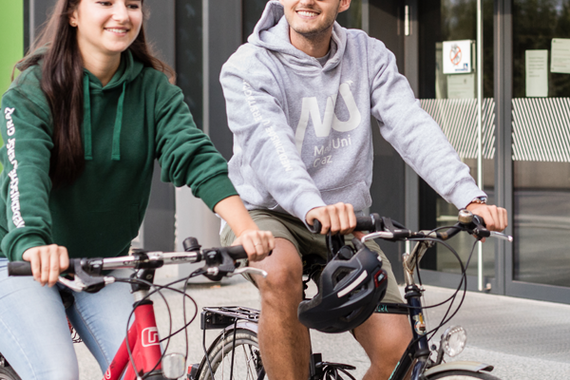
Further Travel Planning
- Choose environmentally friendly and sustainable accommodation (e. g., passive house).
- Discover the surrounding area in the host country instead of driving far.
- Take public transportation when you check out the host country.
- If you travel throughout the country, stay in environmentally friendly accommodation and support sustainable tourism.

Stay on Site
- Walk short distances, ride a bike or take public transportation instead of going by car or taxi.
- Use a reusable water bottle and avoid buying water if the local water quality permits it.
- Conserve resources (e.g., water, electricity).
- Inform yourself about separation of waste and recycling.
- Buy local products (e.g., at a farmers' market).
- Turn off the air conditioning if you don't need it.


